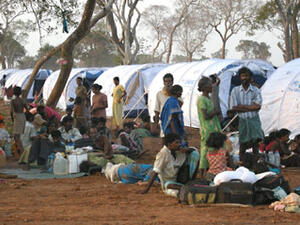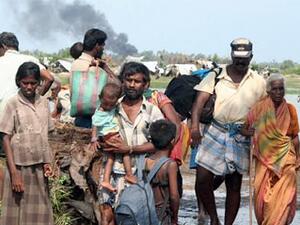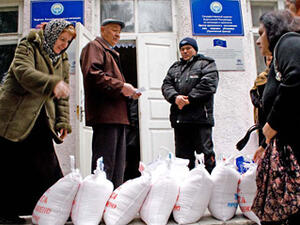UNHCR seeks $195 million for Afghanistan
UNHCR seeks $195 million for Afghanistan

Displaced Afghans in the ruins of Kabul await their chance to return home.
OSLO, NORWAY, Dec. 17 (UNHCR) - UN High Commissioner for Refugees Ruud Lubbers announced today that UNHCR needed $195 million to help 1.5 million Afghans return home next year and to look after Afghan refugees who remain in neighbouring countries.
UNHCR's 2003 funding appeal for Afghanistan and Afghan refugee programmes in seven surrounding countries was presented at a two-day meeting in Oslo, Norway, of the Afghanistan Support Group, which includes key donor countries.
Addressing the meeting, Lubbers outlined plans to return an estimated 1.2 million Afghan refugees next year, including 600,000 from the Islamic Republic of Iran, 500,000 from Pakistan, and 100,000 from other countries.
UNHCR said it also planned to help an estimated 300,000 Afghans displaced within their country to go back to their original homes. Afghanistan still has some 700,000 internally displaced persons (IDPs) driven from their homes by two decades of war and the worst drought in living memory. Some 250,000 IDPs have already returned to their homes with support from relief agencies.
In line with its "4 Rs" concept of repatriation, reintegration, rehabilitation and reconstruction - the four key elements of any post-conflict recovery - UNHCR plans to fit its work into the longer-term effort of development agencies and various parts of the Afghan government.
Lubbers said his agency will continue to provide shelter assistance to needy Afghans during 2003, and plans to distribute 60,000 shelter kits in rural areas. UNHCR also plans to fund various water projects throughout the country, as well as other assistance programmes designed to improve the country's rural infrastructure devastated by decades of war.
Next year, Afghans opting to repatriate under the UNHCR/Afghan government initiative will continue to receive a transport allowance of between $5 and $30, plus a family kit containing plastic tarpaulin, soap, hygienic supplies and wheat flour from the UN World Food Programme.
More than 1.8 million Afghans have returned home since UNHCR and the Afghan government launched the return programme last March. According to government estimates, there are still some 4 million Afghans - a mix of refugees and migrant workers - outside their homeland. Most Afghans living outside their country reside in Pakistan and Iran.
Meanwhile, UNHCR's efforts to help Afghanistan through the winter have switched into high gear as unseasonably cold weather hit areas of the country that traditionally enjoy mild winters. This includes the southern Kandahar region, where temperatures last week dropped to 15°C below zero.
UNHCR and its humanitarian partners in Afghanistan are pre-positioning tents, plastic tarpaulins, blankets, and other supplies to help up to 550,000 people who may face particular hardship this winter, including the 290,000 people who recently returned to their shattered homes and another 260,000 who remain uprooted inside the country.
In southern Afghanistan, the distribution of urgently needed items has started in Nimroz and Kandahar provinces, where 32,000 blankets have already been given to needy Afghans squatting in five makeshift camps around Spin Boldak near the border with Pakistan.
UNHCR now has more than 146,000 blankets and quilts in stock, about 75 percent of the estimated emergency needs this winter. Nearly 30,000 quilts are being produced in central Afghanistan under a cash-for-work scheme supported by the agency. The UN Children's Fund (UNICEF) has also agreed to provide blankets.
Stocks of plastic tarpaulins are now pre-positioned throughout the country to give temporary shelter to those who may find themselves without adequate accommodation. Some 10,000 tents are ready for distribution, and another 5,000 are available from stockpiles in neighbouring Pakistan.
In northern Afghanistan, distribution of urgently needed items to families is underway in Baghlan and Faryab provinces. In western Afghanistan, winter items have been pre-positioned in Badghis and Ghor. Distribution in Farah province as well as in the Maslakh IDP camp in Herat is due to start this week. In central Afghanistan, distribution of winter emergency items to the most vulnerable returnees, including up to 7,000 families in Kabul City, is scheduled to start shortly.
The UN refugee agency has also funded the production in local metal shops of more than 36,000 stoves, with another 25,000 currently under production.
Afghan returnees who have received components for shelter kits have completed or nearly finished assembling 30,000 of the 40,000 kits that UNHCR has distributed throughout the country. Shelter rehabilitation is most advanced in western Afghanistan, where 96 percent of the units are finished or nearly completed.









